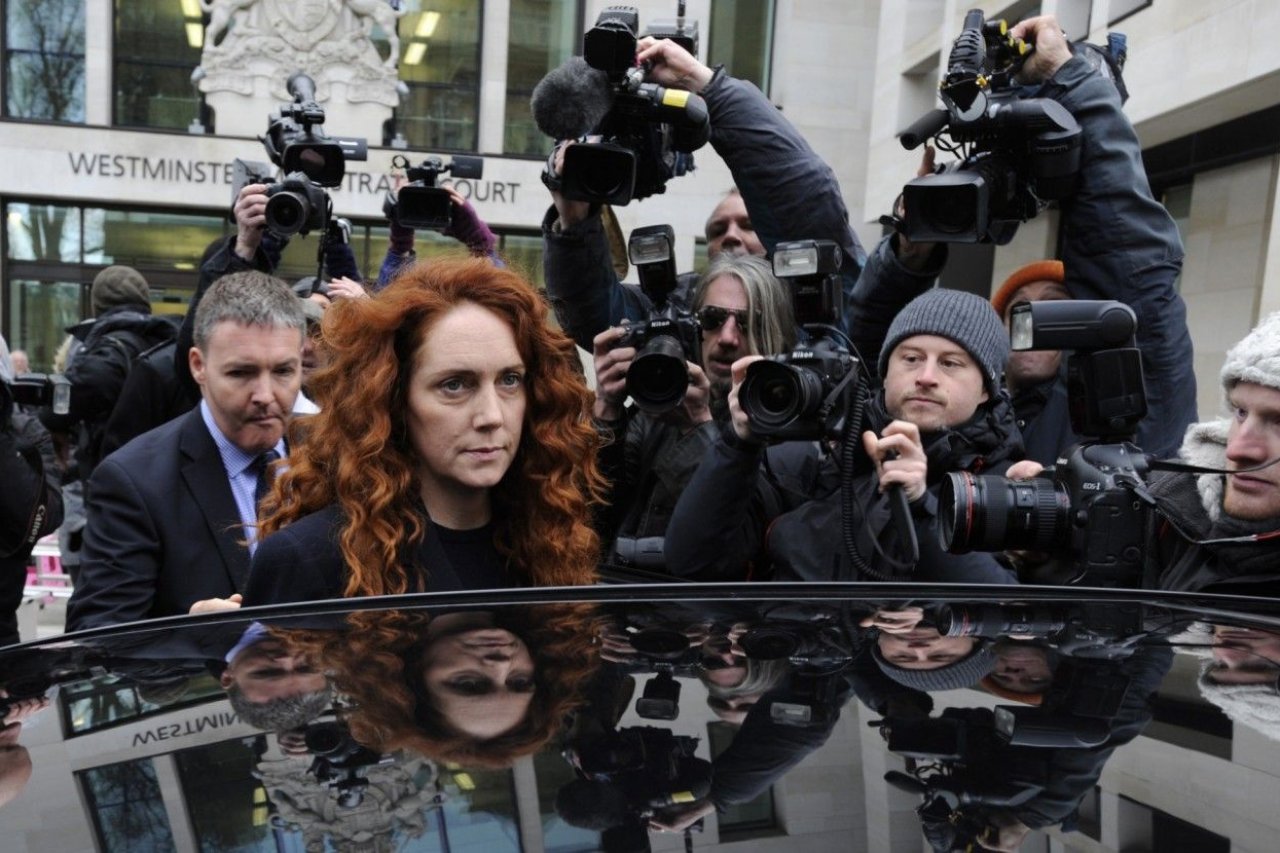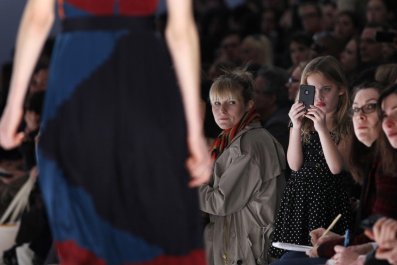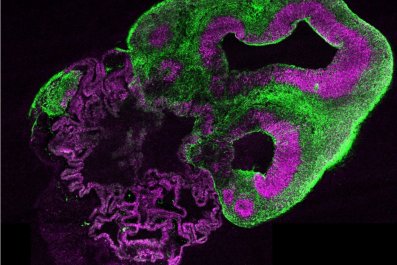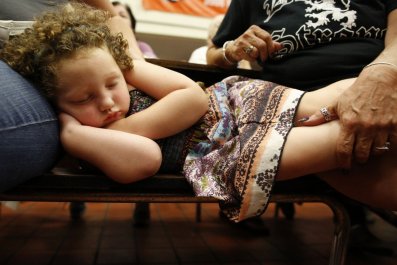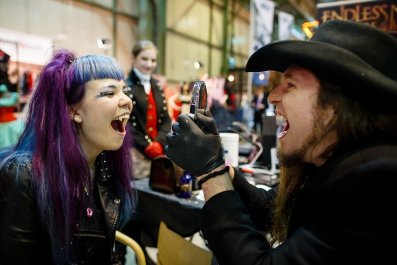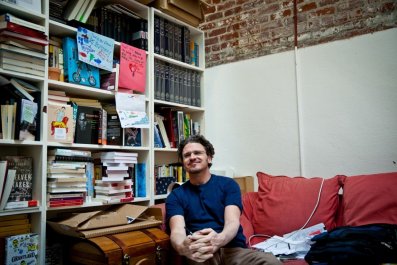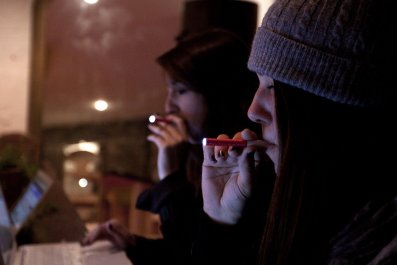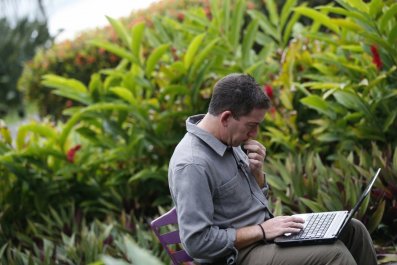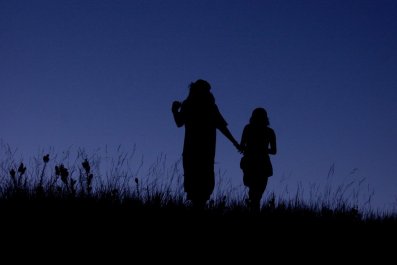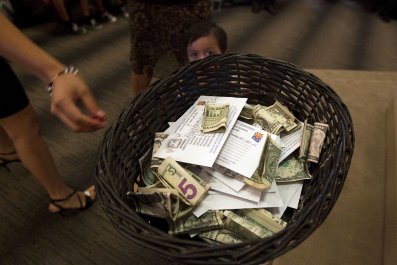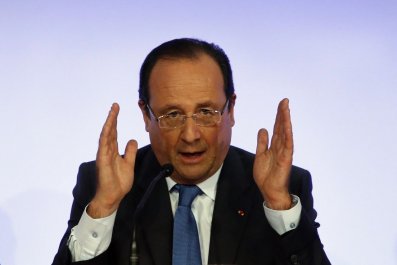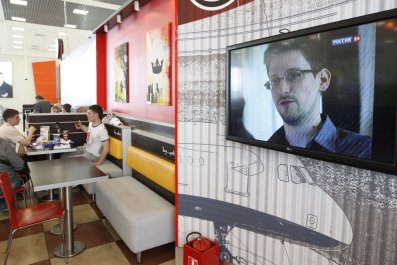In the midst of his company's hacking scandal, Rupert Murdoch headed to his London apartment and emerged with the News International chief executive, Rebekah Brooks, on his arm. Asked by a reporter about his priorities, Murdoch answered, "This one," gesturing with his thumb to Brooks.
Brooks goes on trial in Britain later this month on charges of phone hacking, bribing public officials and concealing computers and documents from police. She will be alongside former colleagues, including Prime Minister Cameron's former press officer Andy Coulson and a private investigator, Glenn Mulcaire. Brooks will also face criminal charges for perversion of the course of justice, along with her husband, Charlie Brooks, her former secretary, and the former security chief for News International. She, like her co-defendants, denies all charges.
Brooks, editor of Murdoch's News of the World, then the Sun, always presented something of an enigma for those who followed her meteoric rise. In her Who's Who entry, she was said to have studied at the Sorbonne. (The Daily Mail reported she had only taken a short course there.) She materialized at the News of the World as a secretary and features writer. Little more than 11 years later she was, at 32, the youngest-ever editor in chief of the News of the World or of any other national newspaper.
Brooks was ambitious, mixing with the powerful and glamorous as she pinged from one top News International job to the next until she became head of the whole British wing of News Corp.
Her boldness, even impudence, tended to pay off. According to her friend Piers Morgan, Brooks prepared for an interview with the presumed lover of Princess Diana at a fancy hotel room by arranging for a team to "kit it out with secret tape devices in flowerpots and cupboards." Another time she stole a scoop from the News of the World's sister paper The Sunday Times by posing as a cleaner at the presses to grab an early copy of the paper and rewrite it for her own publication.
Over time, Brooks became known for her news judgment, at once calculating and impulsive. But she also became memorable for her ability to endear herself to those in positions of power. Inside News Corp, she stood alone in her ability to ingratiate herself with not just Murdoch but his adult children, too - Prudence, Lachlan, Elisabeth, and James.
In 2003, when editor of the Sun, Brooks testified before a parliamentary committee. Labour MP Chris Bryant asked Brooks whether she had ever paid police for information.
Brooks replied, "We have paid the police for information in the past, yes."
Asked whether she would do it again, Brooks said, "It depends."
After that, Brooks refused requests by MPs to answer more questions about paying police. Several lawmakers with the Commons Select Committee on Culture, Media, and Sport told reporters they decided against compelling her testimony in part because Murdoch had privately warned that her papers might retaliate by investigating their personal lives.
Under other circumstances, Brooks might have been considered a victim of hacking. Her first marriage, to the soap opera star Ross Kemp, imploded in 2005, when she was editor of the Sun. Brooks was arrested at 4:00 a.m. on suspicion of assaulting Kemp but was not charged; she told reporters it was "a silly row that got out of hand." Their spats inspired staffers for her old paper, the News of the World, to start hacking into her phone messages.
Brooks and Kemp favored Tony Blair's New Labour, and she befriended Prime Minister Blair, his wife Cherie, and Blair's close friend and fierce rival Gordon Brown and his wife Sarah. Brooks and Kemp split after Kemp's confession of marital infidelity, and Brooks took up with Charlie Brooks, an Eton classmate of the leader of the opposition, the Conservative David Cameron.
The Brooks rented homes on the grounds of Blenheim, the Churchill family's estate, and Chipping Norton, Oxfordshire, where they dined with Cameron and other leading Tory and media figures, including James and Elisabeth Murdoch. Charlie Brooks raised horses, and soon Rebekah was riding too. In one text to Brooks, Cameron wrote, "The horse CB put me on - fast unpredictable and hard to control - but fun."
In the wake of a key address by Cameron, Brooks cheered him on: "Brilliant speech. I cried twice. Will love working together." Later, Brooks tutored the prime minister in the protocol of their modern communiqués. "Occasionally, he would sign them off, LOL-'Lots of love,' " she said, "until I told him it meant 'laugh out loud.' "
In August 2008 Cameron flew on the private plane of Elisabeth's husband, Matthew Freud, a London public relations executive, to the Greek isle of Santorini and met on his yacht with Murdoch and his inner circle.
Cameron attended Brooks's June 2009 wedding. So did the prime minister, Brown. A month later, the Murdochs elevated her to become CEO of News International.
'Homophobic cow'
In the testosterone-drenched alleys of Fleet Street, Brooks proved memorable for her wrath to those who challenged her. MP Chris Bryant never forgot what happened to him in the months after he asked her unwelcome questions at parliamentary hearings in 2003.
A few months later, pictures from a gay online dating site surfaced of Bryant clad only in briefs. Bryant was unmarried, openly gay, and had pushed to relax laws cracking down against sexual activity by gays in public places.
Bryant felt the sting of Wade's casual cruelty at a party thrown by News International at the Labour Party conference.
"She came up to me and said, 'Oh, Mr. Bryant, it's after dark. Shouldn't you be on Clapham Common [a pickup spot for gay men]?'" Bryant recalled. According to Bryant, Kemp snapped back, "Shut up, you homophobic cow."
In the summer of 2011, police investigations into the hacking of the cell phone of a murdered 13-year-old schoolgirl sourced the crime to the Murdoch papers presided over by Brooks. In the Murdoch press, it emerged, hacking was commonplace. Murdoch ordered his son James to shut his main scandal sheet, the News of the World, in an attempt to save the rest of his empire.
Even as James Murdoch shut down News of the World, he sustained his support for Brooks. "I am satisfied that Rebekah, her leadership of this business and her standard of ethics and her standard of conduct throughout her career are very good," James said. He announced he had chosen Brooks to lead the company's internal investigation.
Brooks met with the shell-shocked News of the World staff to explain the decision to shut the paper down. The newsroom had become a crime scene, lacking only police yellow tape to declare areas out-of-bounds. "This is not exactly the best time in my life, but I'm determined to get vindication for the paper and for people like you," she told them.
"By your calling our newspaper toxic, we've all been contaminated by this toxicity," one reporter responded. "There's an arrogance there that you'd think we'd want to work for you there again."
Brooks was apologetic and emphasized her own lack of knowledge of any wrongdoing. "One of the problems, now, is how we dealt with it at the time," Brooks said. "There's a feeling of a cover-up, our rivals think. Eventually, it will come out why things went wrong and who was responsible. And that will be another very difficult moment in this company's history."
Perhaps mindful of the police, lawyers, and prosecutors poring over emails, documents, and phone records inside the newspaper and in people's homes, no one at the meeting articulated the main source of their resentment: Reporters and editors believed their bosses had tolerated, endorsed, and even effectively required these activities.
Cameron, by now prime minister, began edging away from his patrons, the Murdochs. On July 8, 2011 he announced investigations into hacking by police and MPs, and a broad-ranging inquiry into the practices and ethics of the press.
"Because party leaders were so keen to win the support of newspapers, we turned a blind eye to the need to sort [out] this issue," Cameron said. "The people in power knew things weren't right. But they didn't do enough quickly enough - until the full mess of the situation was revealed." Cameron said if he were in Murdoch's position, he would have accepted Brooks's resignation.
Others trained their fire on Brooks. Murdoch's chief outside investor, Saudi prince Al Waleed bin Talal, told the BBC, "For sure, she has to go. You bet she has to go."
News International denied she had made any such offer. Yet behind the scenes, News International eased Brooks from the role she had ostensibly been assigned - to oversee the internal inquiries.
Still, as fresh developments arrived almost hourly, public anger did not subside. Police told Prince Charles he had been targeted for hacking. So had his wife, Camilla, Duchess of Cornwall. "There needs to be root-and-branch change at this entire organization," Cameron told the Commons. "What has happened at this company is disgraceful. It's got to be addressed at every level."
Brown declared the Sunday Times had misrepresented itself to obtain his private financial records. There were suggestions the Sun paid hospital workers to secure documents confirming his infant son had cystic fibrosis. He said he had been punished for challenging the company's plans for consolidation.
The scandal, Brown said, was "not the misconduct of a few rogues or a few freelancers but, I have to say, lawbreaking often on an industrial scale, at its worst dependent on links with the British criminal underworld."
Rupert Murdoch flew to London. He had one overriding concern: to protect Brooks.
Hacking phones of the 9/11 dead
Evidence suggested the most fearsome of consequences for Murdoch: seepage of the scandal to the United States. On July 11, the Mirror reported that a former New York City police officer had been approached by reporters for News of the World who offered to pay him to hack into phone records of people killed in the 9/11 attacks.
U.S. lawmakers took the story seriously. Several senators urged an investigation into whether the Murdoch tabloids had engaged in illegal acts in the U.S. They were joined by congressman Peter King, a Republican who generally made common cause with Murdoch's New York Post and Fox News.
King wrote to FBI director Robert Mueller: "It is revolting to imagine that members of the media would seek to compromise the integrity of a public official for financial gain in the pursuit of yellow journalism."
Lawyers for News Corp in New York spotted dangers. Any federal prosecution could give grist to those who wanted to challenge the ongoing waivers that the Federal Communications Commission had granted News Corp, including regulations that barred networks from owning a stake in production companies that created the shows and banned "cross-ownership" of newspapers and TV stations in a single media market. At various points, Murdoch circumvented, challenged, and even violated these rules.
A second provision of the law did not require so complicated a burden of proof. A company whose shares were publicly traded in the U.S. had to register bribes to public officials in publicly filed documents.
A failure to do so represented a violation of civil law.
Questions were becoming urgent for Murdoch's closest executives in the U.S. and the U.K., and Rebekah Brooks was in the thick of it.
At Murdoch's apartment on Green Park, near Buckingham Palace, a group of senior News Corp officials and lawyers dined in a session convened by Brooks, then still CEO of News International. Among the guests were former New York City schools chancellor Joel Klein, and Brendan Sullivan, a Washington defense attorney who had represented Oliver North during the Iran-Contra hearings.
At the dinner, Murdoch revealed his own plans. This is going to be handled by Joel and Brendan, he declared. I will handle the board. Everyone else stay out of it. Privately, Murdoch had told Klein and Sullivan that they had one mission: to preserve Brooks's standing.
Klein told others that that order would be a tall one. To save the Murdochs and to protect the corporate board, Brooks would probably have to go. But he did not press the chairman. Not yet.
Murdoch leaned on Klein more than ever, who teamed with News International executive Will Lewis to run News Corp's management and standards committee. For the time being, they would please their client, Murdoch. But they knew a reckoning would confront the company down the line.
A laptop dumped in a bin
Such were the pressures that coalesced around News Corp by mid-July 2011. Questions were becoming increasingly urgent for Murdoch's closest executives and Brooks was in the thick of it. (The expensive legal settlements by News Corp went a long way toward convincing the public of the company's guilt.)
MPs who had earlier concluded they had been deceived were angered again. On July 14, John Whittingdale, chairman of the Commons media committee, told reporters Brooks had agreed to testify again. But Murdoch father and son had told the committee they were too busy.
"It is James Murdoch who has said publicly that executives from the News of the World misled parliament in the evidence that they gave to the committee in our previous inquiry," Whittingdale said. "Therefore we are extremely anxious to ask him about that, and we did not feel it was justified to delay until August."
Parliament's deputy sergeant at arms delivered summonses to the offices of the two Murdochs and Brooks. It was the first time Parliament had ordered a summons to compel testimony in almost two decades.
By next day, News Corp stock had fallen a further 5 percent.
Sky's market cap had dropped about 16 percent in just 11 days.
On Friday July 15, Brooks resigned.
"I have believed that the right and responsible action has been to lead us through the heat of the crisis," Brooks wrote to News International employees. "However my desire to remain on the bridge has made me a focal point of the debate. This is now detracting attention from all our honest endeavours to fix the problems of the past."
"Resignation" was a kind gloss to put on the firing. "All the executives used to have a joke within News Corp: Rupert will be loyal to you right up until the very day when he's not," a former senior official at News Corp told me.
Murdoch revived a bit of swagger. "The company has made mistakes," he said. "It is not only receiving appropriate scrutiny but is also responding to unfair attacks by setting the record straight."
The Murdochs gave warning: As they prepared to appear before Parliament, they would once more exercise what they felt was their right to determine what constituted fair criticism.
That swagger didn't last for long. Police arrested Brooks on July 17, a Sunday, and questioned her on suspicion of involvement in hacking cell phone voicemails and paying police and public officials.
On July 19, the day the Murdochs were to testify before the Commons media committee, newspapers were stuffed with reports of a confrontation between Charlie Brooks and security guards at a parking lot near the Brooks apartment. A passerby had given guards two briefcases containing a laptop, an iPhone, and a stack of documents, all of which had been retrieved from a plastic sack dumped in a trash bin.
What happened next is a matter of dispute. What is known is that Charlie Brooks did not emerge from the lot with the computer; a spokesman told papers a friend had left it there by accident. Murdoch's tabloids did not display the ferocity of interest that the episode might have engendered had the person involved been someone else.
Hacker paid a million pounds
By February last year, News International's containment strategy had crumbled. The effort to contain scrutiny to a single reporter and investigator had failed. So had attempts to limit attention to a single newspaper and to protect Rebekah Brooks. Anyone without the last name Murdoch was expendable.
In mid-February, police arrested nine Sun reporters and editors on suspicion of having bribed a breathtaking array of government and law enforcement officials. On February 27, the Leveson judicial inquiry released emails from 2006 suggesting Rebekah Brooks knew Glenn Mulcaire had been paid more than 1 million pounds to hack into cell phones for News of the World. Two days later, James Murdoch resigned from News International.
---
From the book: Murdoch's World: The Last of the Old Media Empires by David Folkenflik. Excerpted by arrangement with PublicAffairs, a member of The Perseus Books Group. Copyright © 2013.



